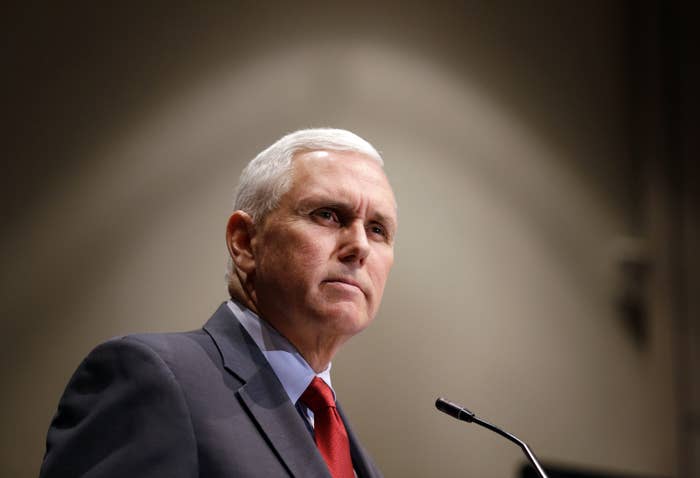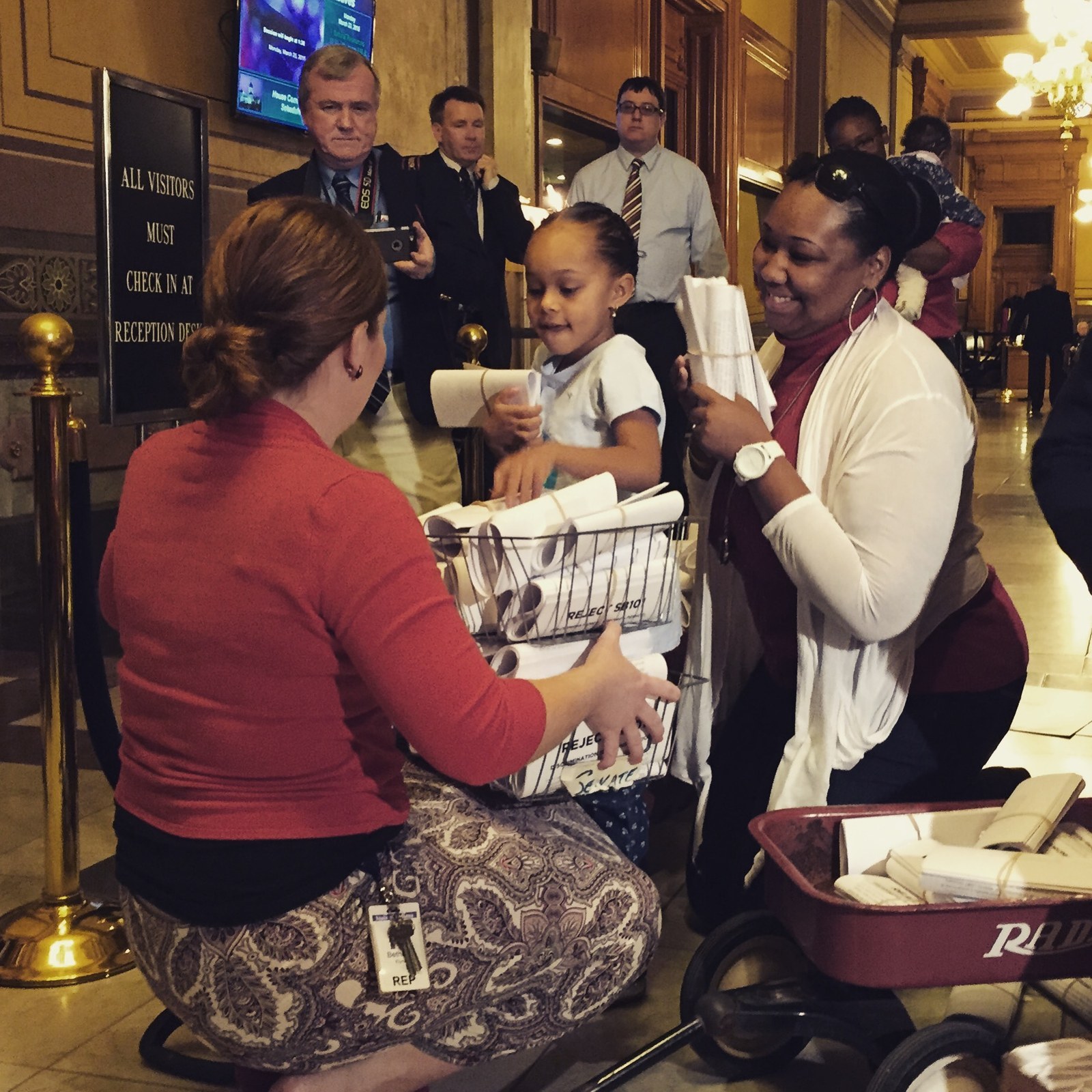
Update: Despite a spirited veto campaign from LGBT advocates who warned that a bill passed this week by the Indiana general assembly legalized discrimination, Gov. Mike Pence signed a religious-freedom bill into law Thursday morning.
"This bill is not about discrimination, and if I thought it legalized discrimination in any way in Indiana, I would have vetoed it," the governor said in a statement. "In fact, it does not even apply to disputes between private parties unless government action is involved. For more than twenty years, the federal Religious Freedom Restoration Act [a federal law passed by Congress in 1993] has never undermined our nation's anti-discrimination laws, and it will not in Indiana."
However, critics insist SB 101 is broader than federal law.
"It's just not true," Jennifer Wagner, a spokesperson for Freedom Indiana, told BuzzFeed News. "This is not the same."
While the Indiana bill says that a “governmental entity may not substantially burden a person’s exercise of religion,” it also applies those rules to businesses and interactions between private parties “regardless of whether the state or any other government entity is party to the proceeding.” Under the Indiana law, a religious liberty defense would be available under all state laws and local ordinances, unless state law provides a specific exemption.
Freedom Indiana had mounted a veto effort, along with national LGBT advocacy organizations, saying the bill provided a "license to discriminate."
"He has signed this despite tons and tons of outcry from every corner of the state," Wagner said. Businesses and religious groups had decried the bill this week — including two conventions that threatened to move their events out of the state.
"It will be used to decline service to LGBT Hoosiers," Wagner said. "This is where we are as a state in the nation. We are going to pick on LGBT people."
But Pence's statement stood firm that this was merely a matter of protecting individual liberty from government intrusion: "I support the freedom of religion for every Hoosier of every faith. The Constitution of the United States and the Indiana Constitution both provide strong recognition of the freedom of religion but today, many people of faith feel their religious liberty is under attack by government action."
Original article: In a landslide 63-31 vote, the Indiana House of Representatives alarmed LGBT advocates Monday by passing a sweeping religious freedom bill that allows private parties — including businesses open to the public — to invoke a religious defense in legal cases.
The bill cleared Indiana's senate in February.
Gov. Mike Pence resisted calls to veto the bill Monday evening, issuing a statement that said the measure "is about respecting and reassuring Hoosiers that their religious freedoms are intact. I strongly support the legislation and applaud the members of the General Assembly for their work on this important issue. I look forward to signing the bill when it reaches my desk.”
Critics had ramped up their campaign to defeat the measure in recent weeks, including delivering 10,000 letters of protest to the capitol Monday morning. Freedom Indiana and several national organizations argued the bill would create a loophole in civil rights laws and allow discrimination, particularly against LGBT people.
"Someone could use their religious beliefs to claim that they have the right to refuse complying with existing nondiscrimination laws," said ACLU lawyer Eunice Rho, who opposes the bill.
Key proponents downplayed those charges, however, insisting the bill mirrors existing federal law and it would merely prevent the government from forcing people to violate their faith.
But other supporters strayed from those talking points — apparently confirming they sought to let business owners turn away certain clientele.
“God’s word tells us to do all things unto the Lord,” Republican Rep. Bruce Borders said on the House floor. “If we truly are doing things unto the Lord, our business can be... a church or sanctuary. People deserve protection in their businesses as well, not just on Sunday morning.”
The religious freedom issue has grown urgent in state legislatures this year amid a recent wave of same-sex marriage laws and court decisions. The raft of bills comes after several business owners refused to provide goods or services for same-sex weddings, leading to lawsuits in which the business owners charged with discrimination unsuccessfully attempted to use religious defenses.
Democrats widely blasted the bill, including Rep. Scott Pelath.
"The thing most troubling is that it is fundamentally unfair. We are singling out friends and neighbors and citizens," he said.
"This is a made-up issue," Pelath added. "It is made up for the purpose of going in front of a few Indiana citizens and thumping your chest for social causes."

The bill's prime sponsor in the house, Republican Rep. Timothy Wesco, disagreed.
Wesco said the law is "modeled" after the federal Religious Freedom Restoration Act. Passed by Congress in 1993, that law and others like it at the state level prevent government from burdening a person's exercise of religion.
"People have argued that this will allow discrimination," Wesco said. "You cannot show me a single case where applying this test of religious freedom issues has resulted in discrimination of any kind."
However, the Indiana bill is broader than federal law. While the Indiana bill says that a “governmental entity may not substantially burden a person’s exercise of religion,” it also applies those rules to businesses and interactions between private parties “regardless of whether the state or any other government entity is party to the proceeding.”
"You cannot show me a single case where applying this test of religious freedom issues has resulted in discrimination of any kind," said bill sponsor Rep. Timothy Wesco.
The religious liberty defense would be available under all state laws and local ordinances, unless state law provides a specific exemption.
Sixteen law professors sent a letter to Indiana lawmakers in February appearing to support the notion the law could allow turning away customers.
The professors cited a New Mexico case in which a same-sex couple successfully sued a photographer for discrimination for refusing to take wedding photos, despite the state already having a Religious Freedom Restoration Act (RFRA).
"The New Mexico Supreme Court held that its state RFRA does not even apply when the religious objector has been sued by a private citizen," stated the letter, which was led by Daniel O. Conkle, a professor of law at the University of Indiana. "That was almost certainly a mistake, and the proposed Indiana legislation makes it clear that the Indiana RFRA would indeed apply in these circumstances."
An opponent of the bill, American Civil Liberties Union staff attorney Eunice Rho, made a similar argument: "Someone could use their religious beliefs to claim that they have the right to refuse complying with existing nondiscrimination laws. Even though Indiana does not have a statewide LGBT-inclusive nondiscrimination law, major cities like Indianapolis have nondiscrimination ordinances that protect against discrimination based on gender identity and sexual orientation."
Several LGBT groups launched a volley of e-mails promoting a gubernatorial veto of the bill. An alert from the National LGBTQ Task Force pointed out that Pence could "follow the lead of former Governor Jan Brewer (R-AZ)," who vetoed a similar bill in 2014.
